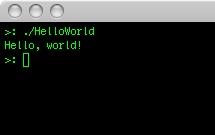Hello World: Difference between revisions
Jump to navigation
Jump to search
imported>Alex Bravo No edit summary |
imported>Alex Bravo mNo edit summary |
||
| Line 1: | Line 1: | ||
[[Image:HelloWorld.jpg|right|frame|Hello World program in a terminal]] | |||
The '''Hello World''' program is probably the most widely recreated piece of software ever as it is used by many programming languages books and articles as a cursory introduction into a language's [[syntax]]. It was introduced in the book ''The C Programming Language'' and is often one of the first programs that a [[programmer]] writes when learning a [[programming language]], as it introduces the [[programmer]] to the constructs that he/she will be dealing with in the particular language at hand, familiarizing him with [[variable (programming)|variables]] and output. | The '''Hello World''' program is probably the most widely recreated piece of software ever as it is used by many programming languages books and articles as a cursory introduction into a language's [[syntax]]. It was introduced in the book ''The C Programming Language'' and is often one of the first programs that a [[programmer]] writes when learning a [[programming language]], as it introduces the [[programmer]] to the constructs that he/she will be dealing with in the particular language at hand, familiarizing him with [[variable (programming)|variables]] and output. | ||
Revision as of 13:30, 2 April 2007
The Hello World program is probably the most widely recreated piece of software ever as it is used by many programming languages books and articles as a cursory introduction into a language's syntax. It was introduced in the book The C Programming Language and is often one of the first programs that a programmer writes when learning a programming language, as it introduces the programmer to the constructs that he/she will be dealing with in the particular language at hand, familiarizing him with variables and output.
See also
External links
The Hello World Collection (more than 300 programming languages)
